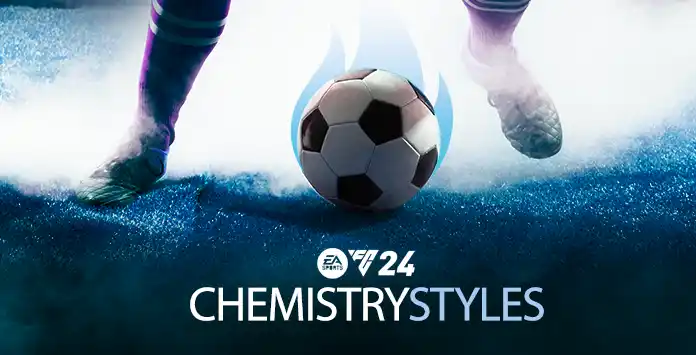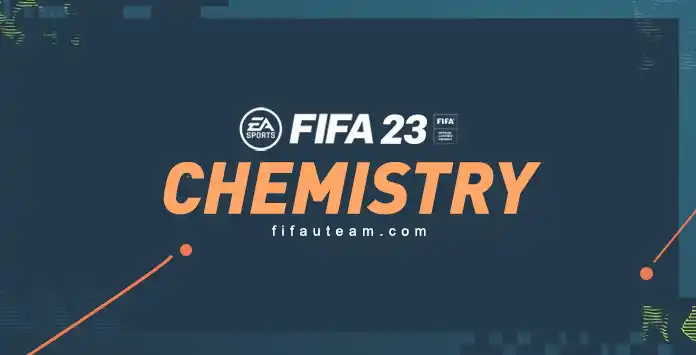FIFA 23 CHEMISTRY STYLES
A chemistry style is a consumable that allow players to choose which attributes will be affected by the chemistry.

FUT Styles
Chemistry Style Items are responsible for allowing you to choose which
You can apply Style Items to any player, adjusting his attributes to the squad’s needs. These items do not change the chemistry numbers. They redistribute the stats that will receive chemistry boosts.
You are allowed to use Styles in a player as many times as you want, but only one per player at a time. He will keep with the style until you apply a new one. When someone trades a player item, the buyer will keep the style that it is active.
There are twenty-four chemistry styles: nineteen for outfield players and five for goalkeepers. You can only apply outfield player chemistry styles to outfield players. However, goalkeepers’ chemistry styles are exclusive to goalkeepers, and you cannot use outfield player chemistry styles on them. You can also use styles on special players, including Icons and players on loan.
Styles List
Here is the list of all FIFA 23 Chemistry Styles.

The Best Chemistry Styles
When choosing a chemistry style, you must consider many factors, including price, position, formation, play style, squad, and player attributes.
In the following, we suggest the best chemistry styles for each position, so it makes you quickly pick the right one.
Goalkeepers
- Glove
- Basic
- Wall
Center-Backs
- Sentinel
- Anchor
- Shadow
Full-Backs
- Shadow
- Powerhouse
- Guardian
Defensive Midfielders
- Backbone
- Powerhouse
- Shadow
Center Midfielders
- Artist
- Maestro
- Deadeye
Wingers
- Engine
- Catalyst
- Hunter
Strikers
- Best Style: Finisher
- Runner-Up: Hawk
- Special Mention: Hunter
– Finisher to those who play as a reference in the opposite box;
– Hawk to those who also want mobility;
– Hunter to those who play in counter and don’t like to cross to the box;
– Marksman to skillers;
– and Sniper to very fast forwards.
Frequently Asked Questions
FIFA 23 chemistry styles are consumable items that allow you to choose which attributes will be affected by the chemistry.
As long as your player has any chemistry, his active style will be essential in how he performs. The bigger the chemistry, the more impact the style will have.
There are twenty-four FIFA chemistry styles: 19 for outfield players and 5 for goalkeepers. An outfield player chemistry style can be applied to any outfield player. However, goalkeeper chemistry styles are exclusive to goalkeepers, and outfield player chemistry styles cannot be applied to a goalkeeper.
These items permanently change a player’s Chemistry Style until a different one is applied to him.
FIFA 23 chemistry styles will have the maximum effect if a player has the highest chemistry possible. However, if he has the lowest chemistry, it doesn’t make sense to apply him a style item since it won’t make any difference.
There are three things about FIFA 23 chemistry styles you can find on a player’s item:
- The name of the style that is active in that player;
- The stats impacted by the style;
- The three diamonds indicating how big is the chemistry.
If you want to use a style in a player, follow these steps:
- From the main FUT screen, press R1/RB twice to go to the [Club] tab;
- Select [Squad];
- Choose a player and press Square/X;
- Select [Apply Consumable];
- Press R1/RB to navigate to the ¨Styles] category;
- Select the desired style item and confirm.
FIFA 23 Chemistry styles can only be used once as with any other consumable item. A player can only have an active style at a time, and the effect lasts until you apply a new style. The buyer will keep the active style when you trade a player item.
There are many things you should look at before picking a chemistry style. It is a difficult choice, but it is ultimately your decision. Pay attention to the following points:
- Price
This is probably the most overlooked factor when choosing the right chemistry style to apply to the players. Teams with low budgets should pay attention to this point because the prices of these cards may range between 150 coins and 5,000 coins. You never should quit buying the player you want to be able to apply the chemistry styles to your players. Look at these cards as an adjustment. It is also important to note that a more expensive chemistry style doesn’t mean that it is a better style. Hunter and Shadow are the most expensive cards. However, the Basic style is many times the best choice. - Position
The position is an essential factor when choosing a chemistry style. While not mandatory, most of the time, defensive styles are applied to defenders (Sentinel, Guardian, Gladiator, Backbone, and Anchor), attacking styles to forwards (Sniper, Deadeye, Hawk, Marksman, and Finisher), and the other styles to the midfielders (Artist, Architect, Powerhouse, Maestro e Engine). The five goalkeeper styles may only be applied to these players. Generally speaking, it is a good practice to apply chemistry styles according to the player’s position, if it is in line with the other factors. - Formation
The formation has an important role when choosing a chemistry style. Players who play in the same position but different formations may have different needs. Let’s take the example of the center-backs. If they play in a 4xx formation, they should be fast. However, the defending and heading stats are much more critical to the central CB of a 5xx formation. When choosing a chemistry style, you should carefully analyze the roles of each player in the team. - Play Style
No one plays FIFA in the same way. There are better and worse players. Some like to use the wings to attack, and others like to do it by the middle. Some prefer to play in counter-attacks, and others prefer to keep the ball. Not all of these preferences are reflected in the formations we choose. I.e., two people with the same formations and the same players can make use of them in a different manner. When choosing a chemistry style, you should carefully analyze the roles of each player according to your play style. - Squad
Another factor that should not be overlooked is the environment surrounding the player to who we want to apply a style. That is the teammates and the needs of the squad. If, for example, you are playing in a formation with three CMs and two of them have high defensive attributes, it will be reasonable not to improve this attribute in the third CM and give preference to others that can be assumed as added value for the team. - Player’s Attributes
Applying a chemistry style without knowing the players’ attributes is impossible because that’s what you are trying to improve. If, for example, a player already has a stat at 99, it would be a waste to use a style that boosts that stat.
One of the most common questions is the approach that should be done: is it better to boost the lowest stats to get a more balanced player, or is it better to boost the higher stats to make the player even better than their opponents? The answer is not easy. Generally, players tend to follow the second option because, most of the time, the highest attributes are also the most important according to the players’ position.
For example, Messi has a low defending stat because he doesn’t need it to play well in his position. Naturally, players try to improve his attacking attributes. But sometimes, it may be different. When a player plays in a position and formation in which the importance of the various attributes is not so uneven, it may be better to try to balance the player.
Let’s look at the example of Harry Kane. He is a great striker, but many people avoid playing with him because his pace is poor. In these cases, it makes more sense to apply a style to improve his speed instead of his shooting and physical, which already are incredibly good. Choosing a chemistry style according to the players’ attributes is very personal. It depends on who is choosing.
For example, Messi has a low defending stat because he doesn’t need it to play well in his position. Naturally, players try to improve his attacking attributes. But sometimes, it may be different. When a player plays in a position and formation in which the importance of the various attributes is not so uneven, it may be better to try to balance the player.
Let’s look at the example of Harry Kane. He is a great striker, but many people avoid playing with him because his pace is poor. In these cases, it makes more sense to apply a style to improve his speed instead of his shooting and physical, which already are incredibly good. Choosing a chemistry style according to the players’ attributes is very personal. It depends on who is choosing.